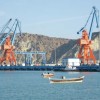Indian State Should Focus on Unconventional Methods: Jamal Nasir Baloch
Balochistan: China has commercial, military interests in Gwadar: US think-tank

(BW News Webdesk) WASHINGTON: China has both commercial and military interests in the Pakistani port of Gwadar, the US think-tank community has told lawmakers, but Islamabad of late is realising that the Chinese investment there is more about its own economic and strategic interests.
The strategic Gwadar Port in Balochistan province is being built by China under a multi-billion economic corridor.
According to media reports last month, Pakistan may allow China to build a military base in Jiwani area which is close the strategic Gwadar port being developed by Beijing.
At the same time, recent developments indicate the Pakistani leadership has increasingly been realising that Chinese investment is more about the latter’s economic and strategic interest, members of the community told lawmakers during a Congressional hearing on Pakistan by the House Foreign Relations committee.
“Going back a decade, a lot of Indian strategists were concerned about and publicly complaining about the possibility China would build a string of pearls of port facilities and logistics facilities along the Indian Ocean rim and those concerns were sort of downplayed at the time,” said Jeff Smith, a research fellow for South Asia at the Heritage Foundation.
“But I think they may have just come a decade too early because what we have seen in recent years is that China does have plans for military facilities and installations,” he said in response to a question from Congresswoman Ann Wagner.
Smith commended the Trump administration for its efforts to strengthen partnership with India.
“That, in some ways, we see India as a net provider of security in the Indian Ocean and that partnership has made really dramatic progress over the past 10 years,” he said.
Smith said The US has a unique relationship with Prime Minister Narendra Modi and the Trump administration is “very bullish” to move it forward.
“A strong US-India partnership more than anything will secure our interests in the Indian Ocean,” he said.
Noting that last fall Pakistan refused to capitulate to China’s demand to accept Chinese currency within the Gwadar free zone, Ann Wagner asked if they see Beijing’s funding conditions for the China-Pakistan economic corridor becoming a wedge issue that inhibits cooperation between the two countries.
“President Trump has advocated for 350-ship Navy, given that China seems to have designated Gwadar a future PLA naval base, are we doing enough to prepare for China’s creep westward?
“There have been reports of rising tensions. Pakistan also refused Chinese assistance for Bhasha dam because the conditions were too stringent. Pakistan’s minister for shipping told the Senate that 90 percent of the revenue from Gwadar will go to China,” said Aquil Shah, a non-resident scholar in the South Asia Program at the Carnegie Endowment for International Peace, and Wick Cary, assistant professor in the Department of International and Area Studies at the University of Oklahoma.
Shah said Pakistani officials realise that this is not about Pakistan’s economic development per se but about Chinese commercial economic interests.
“And so, there are tensions also amongst the smaller provinces because they feel like, again, this project has been hijacked by Punjab and left them out of the loop. So, there’s domestic tension but there’s also frictions with China on certain issues, including the currency issue,” he said.
China and Pakistan are currently building a multi-billion economic corridor, linking Pakistan’s Gwadar port with Xinjiang province to improve connectivity between the two countries.
A route through Gwadar offers China its shortest path to the oil-rich Middle East, Africa, and most of the Western hemisphere, besides promising to open up remote, landlocked Xinjiang.
Courtesy: The Economic Times









